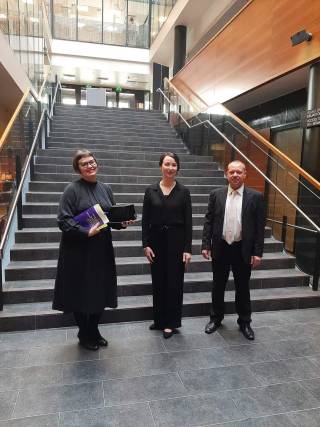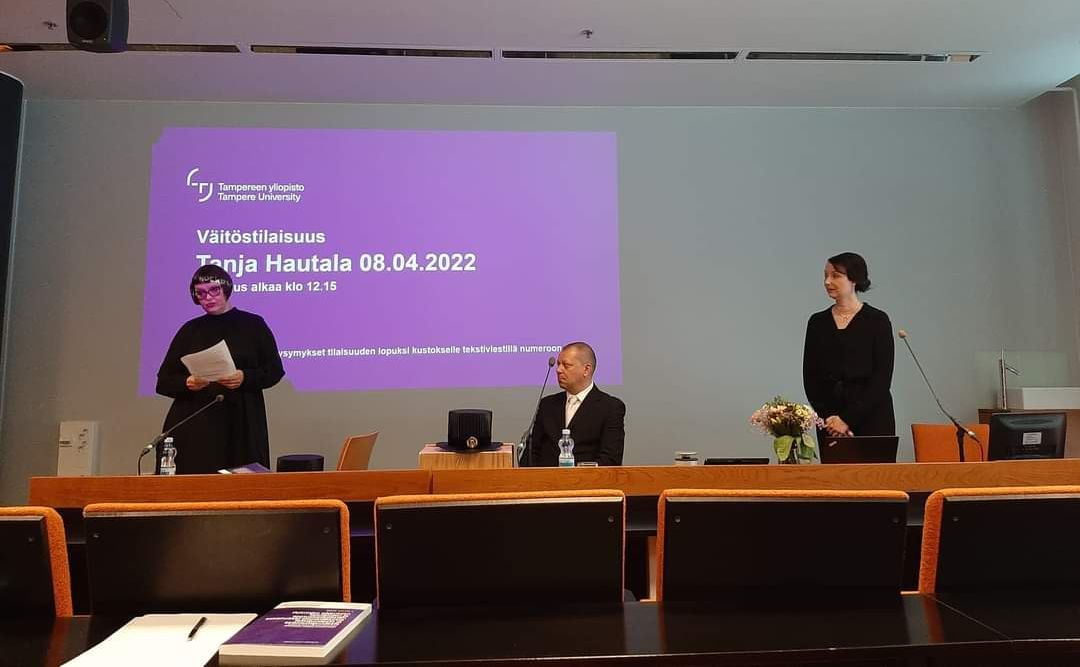Tanja Hautala graduated with a Master’s degree in Health Sciences from the University of Tampere in 2007. Since then, she has worked as a nursing teacher at the University of Applied Sciences and as a doctoral researcher at the Faculty of Education at the University of Tampere, and at the same time participated in the activities of the Higher Education in Transition (HET) research group of the Faculty of Education. In addition to all this, Hautala has also previously worked as a nurse and has graduated as a professional study counsellor.
“I ended up as a doctoral researcher through suitable expertise and my own interest. I’d say an interesting subject found me when I wondered how the study guidance is arranged in Finnish higher education institutions. Even in my study counsellor training, guidance in higher education institutions was not in a spotlight. I also noticed that the study guidance practices were very different from each other between higher education institutions or even within them. I was very interested in the subject, and I noticed that there was a gap in previous research on the subject in Finland,” Hautala explains.
In her doctoral dissertation ‘Opintojen ohjauksen toimijoiden ja opetushenkilöstön kokemukset ammatillisesta toimijuudesta ja asiantuntijuudesta: yhteys korkeakouluorganisaatioiden hallinnollisiin piirteisiin ja johtamiseen’ (Guidance actors’ and teaching staffs’ experience of professional agency and expertise – connection with the administrative features and leadership of higher education organisations) Hautala studied administrative features that potentially affect the experience of professional agency and expertise of the personnel of higher education organisations. Based on the results, the experience of professional agency and expertise were most challenged by tightly coupled administrative features. The experience of professional agency and expertise was most supported by a hybrid style of administration consisting of both loosely and tightly coupled administrative features.
Hautala’s research focused on the study guidance of higher education institutions, but the experiences of professional agency and expertise are very common phenomena, so the results can also be useful in another context. Based on the results of the doctoral dissertation research interviews, in addition to the hybrid style of management, organisations should ensure, among other things, the possibility of autonomy, support for decision-making, opportunities for influence, opportunities to utilise innovation, opportunities to collaborate, clear and shared practices, recognition and signs of trust, the functionality of the flow of information and adequate orientation of new staff. In addition, the success of organisations is promoted by everyone having an understanding of the areas of expertise and functions of the organisation, i.e. what competences are involved in the organisation’s operations.
Organisations should invest in competence development and horizontal career development
A competent, professional, and motivated staff is the organisation’s most important asset, and the competence and know-how is not static in form, but dynamic. Instead of focusing on what kind of expertise the organisation and its’ individuals have, it would also be worth considering what kind of competence potential the organisation could have and what kind of competences will be needed in the future. In addition to vertical career development, horizontal career development is also important for maintaining future skills.
“Organisations can develop their own expertise in a completely new direction by supporting the development of personnel’s expertise. An effective way to develop an organisation’s competence is not through the same training path that all personnel go through. When a person gets to choose the direction in which to develop themselves, they also have a genuine desire to do their own best for their organisation, so that both benefit. Supporting staff in developing their own skills is like putting money into a bank,” Hautala clarifies.
“Even in higher education institutions, it is not possible to rely on adult students knowing what to do in higher education institutions and how, and how to take into account also their own coping. Combining studies, work and family life can be challenging. Similarly, higher education institutions also face students with mental health and coping challenges, as well as the need for guidance in studies. It is in everyone’s interest that the studies proceed as planned. Higher education institutions are places where future experts are trained, which is why supporting their staff is especially important,” Hautala says.
Personal interest in the research topic supported the entire research process
Hautala says that the interesting topic in the doctoral researcher’s work is essential. She was supported by the interest towards the dissertation topic throughout the research process right up to the end of the process. In addition to the interesting nature of the topic, the social impact of the completed doctoral dissertation can strengthen the experience of relevance.
“I would say that if you have found an interesting topic that you want to explore, and you know that you want to invest your time in it, then I recommend launching a dissertation process. Research work is very rewarding. The doctoral dissertation provides a lot of project expertise and other generic know-how that also have value in the labor markets outside academia,” Hautala says.
“Above all, it is worth investing in the research plan. The time set in the research plan will pay for itself many times later. It is worth clarifying for yourself what the aim and purpose of the doctoral dissertation is. You can try to understand the social impact of your doctoral dissertation from the perspective of individuals, organisations or society, for example,” Hautala says.
Writing a doctoral dissertation is a long process that requires uninterrupted working hours. Many people do doctoral research, such as Hautala, among other work. As a job, research requires perseverance, because it is hard work that requires doing partly mechanical tasks, but also innovation that requires creative thinking. There must also be the ability to manage entities and the courage to rely on one’s own ability and intuition to write the analysis done as the results of the doctoral dissertation.
In the long research process, the progress of the work was helped by setting yourself clear goals, goal scheduling and sticking to the schedule. In general, doctoral dissertation requires the ability to direct one’s own activities and set clear goals. Research is very rewarding as a job, and the work is of the kind that you are able to use a wide range of your strengths. Hautala recommends to explore yourself, whether you would like the research work yourself and if it suits your own personality.
“It’s a good idea to map your own strengths and resources. But it’s not just about theoretical skills or good success in previous studies, but we all have different strengths. Research work can be an opportunity where one’s own strengths can shine in a whole new way, and maybe for the first time. During the doctoral dissertation process, it is worth accepting a bad conscience as something going alongside you, which comes from not using all your free time to work on a doctoral dissertation. A clear division between leisure and working on a doctoral thesis helps to cope,” Hautala says.
It’s a good idea to also map out your own possibilities, which are always different depending on everyone’s situation. Even if you do your doctoral research independently, you don’t have to do the research on your own, but you can seek for peer support from social media, for example. Towards the end of her dissertation process, Hautala joined Tutkivat opettajat [the Researching Teachers] group on Facebook, through which she feels that she received significant peer support from people in the same situation.
“In addition to grant applications, it is also worth exploring your own possibilities for study leave or adult education support. This could also make it possible to get yourself the opportunity to work without interruption, which is important in work that requires time for concentration,” Hautala says.
The dissertation defence was a spectacular event with which everything culminated
Hautala’s article dissertation was reviewed at the Faculty of Education and Culture at the University of Tampere in April 2022. The opponent was Professor Sanna Vehviläinen from the University of Eastern Finland and custos appointed by the Faculty of Education and Culture was Docent Jaakko Helander from HAMK Edu.

“About half of the writing of a doctoral dissertation is hard work and about half is creative thinking, insights and innovation. In other words, hard work means processing material, such as transcribing interviews, browsing databases, and searching for and going through previous information. However, the research itself is so rewarding that, in retrospect, I would go into the process again”, Hautala says.
“The dissertation defence event was wonderful. The event and the whole day of the dissertation defence was the highlight where the whole process culminated and made all the hard work worth the effort. In all its excitement, it was great to be able to discuss one’s own research topic with another expert. The event itself was also a learning process, from which I got a lot of thoughts. This helped to brainstorm a research topic related to postgraduate studies, which will be related to the development of expertise”, Hautala reveals.
“I am grateful for the opportunity to cooperate in research with the Faculty of Education and Culture of the Tampere University and with the HET research group. I have already started to brainstorm my research topic for postgraduate studies, and I hope that the cooperation that has worked well has possibilities to continue in the future,” Hautala says.
At the moment, Hautala works as a special planner of education, research and development at the Finnish Centre for Client and Patient Safety. She assists in implementing the national Client and Patient Safety Strategy published this spring as the coordinator of its second strategic priority, Thriving and competent professionals.
“I ended up as a special planner through suitable expertise and previous research work, as well as through good fortune. My friend noticed the announcement and said it sounds just like you, and I agreed, and was luckily selected” Hautala says.
Text: Helka Hirvonen and Tanja Hautala
Photos: Tanja Hautala
Dissertation:
Hautala, T. (2022). Opintojen ohjauksen toimijoiden ja opetushenkilöstön kokemukset ammatillisesta toimijuudesta ja asiantuntijuudesta: yhteys korkeakouluorganisaatioiden hallinnollisiin piirteisiin ja johtamiseen (Guidance actors’ and teaching staffs’ experience of professional agency and expertise – connection with the administrative features and leadership of higher education organisations). Tampere University. https://urn.fi/URN:ISBN:978-952-03-2341-7
Read more:
Hautala, T., Helander, J., & Korhonen, V. (2021). Administrative structures of higher education institutions – connection with the experience of professional agency of teaching staff, International Journal of Leadership in Education. https://doi.org/10.1080/13603124.2021.1937704
Press release on the doctoral dissertation [in Finnish]: https://www.tuni.fi/fi/ajankohtaista/tanja-hautala-korkeakoulujen-johtamisella-kannattaa-tukea-henkilokunnan-ammatillisen
Customer and patient safety strategy and implementation plan 2022-2026. Ministry of Social Affairs and Health. https://julkaisut.valtioneuvosto.fi/handle/10024/163858

